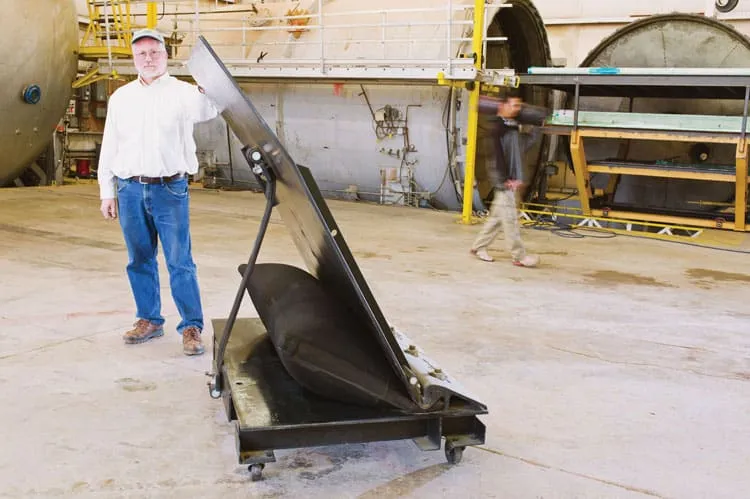Obermeyer Hydro’s reputation inflating
2012 Bravo! Entrepreneur — Outlying Communities

With the demand for water and electric power expected to rise with world population growth, Wellington-based Obermeyer Hydro appears well-positioned to take advantage.
The company makes water-control gate systems that use inflatable rubber bladders and fabricated steel gates to hold or release water from dam spillways, irrigation canals, river diversions and other water projects.
Obermeyer Hydro’s control systems automatically inflate and deflate the bladders as needed to open and close the gates.
SPONSORED CONTENT
“The bladders, which are constructed similar to a tire, and the fabricated steel gate panels are mounted on dam spillways,” company founder Henry Obermeyer explained.
The highest gates the company has made are 22 feet high and the longest are 1,000 feet across.
The systems are more effective than traditional overflow dams, known as fixed weirs, because they can be lowered during floods to maintain a stable water level behind a dam or in a canal.
Fixed weirs, without a release capability, can cause upstream flooding along rivers during heavy rains, water releases or heavy snowmelt, Obermeyer said.
Obermeyer gates are also superior when used to divert water for treatment plants and turbine intakes at hydroelectric dams.
Fixed weirs retain organic sediment that can get pumped into the treatment plants. When the plants treat the water with chlorine, it creates a mixture that’s “carcinogenic, in addition to tasting awful,” Obermeyer said.
The weirs also retain grit and sediment that can cause turbines to wear out prematurely.
“If our gates are used, each naturally occurring flood causes a flushing of the organic and inorganic sediment,” he said.
About 450 Obermeyer Hydro systems have been sold since Obermeyer founded the company in Connecticut in 1987. Obermeyer, an Aspen native and a Colorado School of Mines graduate, moved the company to Wellington in 1990.
“I was originally from Colorado, so I wanted to get back to Colorado,” he said.
The systems have been installed in more than 24 countries, mostly in the United States, Europe and the Far East.
Obermeyer Hydro has grown from a two-employee business in 1990 to a workforce of 57 with $10 million in sales in 2011. The company is now tripling its capacity by adding 23,000 square feet to its factory.
The factory floor will be 400 feet in length compared with 100 before.
The project is 90 percent complete, Obermeyer said.
“We have a good tailwind going right now,” he said. “We’re hiring people.”
The company constructs its rubber bladders at the factory, taking yarn that has been woven with rubber reinforced by tire cord and then curing it and fabricating it to fit the needs of each project.
“We also build the (electrical) systems that control the flow of air to and from the air bladders and the electrical controls,” Obermeyer said.
Obermeyer created the prototype for the systems while working on maintaining water levels at a dam in Vermont during the 1980s.
“We needed to control upstream water level within two inches behind the dam, and we weren’t able to do it with (existing technology),” he said.
Obermeyer Hydro designed and built the 15 gates on the Larimer-Weld irrigation canal in Northern Colorado that release water and adjust to keep the level constant within less than an inch, he said.
Some of the systems are solar-powered, though systems at dams typically run off the electricity produced by the dam.
“The electricity runs an air compressor, which is used to raise and lower the gates,” Obermeyer said.
The company has created other products to meet demand for the gates in other applications.
For example, Obermeyer Hydro also makes inflatable tunnel-boring machine shields that prevent groundwater from flooding tunnel construction areas.
With the demand for water and electric power expected to rise with world population growth, Wellington-based Obermeyer Hydro appears well-positioned to take advantage.
The company makes water-control gate systems that use inflatable rubber bladders and fabricated steel gates to hold or release water from dam spillways, irrigation canals, river diversions and other water projects.
Obermeyer Hydro’s control systems automatically inflate and deflate the bladders as needed to open and close the gates.
“The bladders, which are constructed similar to a tire, and the fabricated steel gate panels are mounted on dam spillways,” company founder…
